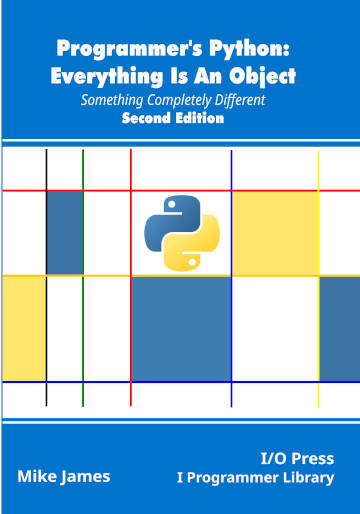| August Week 3 |
| Written by Editor | |||||||||||||
| Saturday, 20 August 2022 | |||||||||||||
|
Every day I Programmer has new material written by programmers, for programmers. This digest gives a summary of the latest content, which this week includes How to Terminate A Process Gracefully with SIGTERM in Kubernetes and an article from our History section celebrating the inventor and computer pioneer, Clive Sinclair. To receive this digest automatically by email, sign up for our weekly newsletter.
August 11 - 17, 2022 Featured Articles
Programming News and Views
Books of the WeekIf you want to purchase, or to know more about, any of the titles listed below from Amazon, click on the book jackets at the top of the right sidebar. If you do make Amazon purchases after this, we may earn a few cents through the Amazon Associates program which is a small source of revenue that helps us to continue posting. Full Review
Mike's Verdict: If you want a book that tells you what ML was like before neural networks became the main deal then this is a great book. It gives you an overview of a wide range of techniques that come under the heading of machine learning - how important these ideas will be for you depends very much on what sort of work you are planning to do. Missing from the account is anything about clustering, dimensional reduction and, my personal favourite topic, discriminant analysis. What the book covers it does very well and it offers lots of insights into how things work - but you do need some math and you need to want to know about these historically important ideas. Added to Book WatchMore recently published books can be found in Book Watch Archive. From the I Programmer LibraryLatest publications:
This month sees the publication of the revised second edition of Programmer's Python: Everything Is An Object in which Mike James reveals how Python has a unique and unifying approach with regards to class and objects. This is the first of a set of titles at intermediate level for the programmer who wants to understand what makes Python special and sets it apart from other programming languages, hence the strap line "Something Completely Different - which is, of course, a reference to the Monty Python TV and film brand that inspired Guido Van Rossum to name his new language. The subject is roughly speaking everything to do with the way Python implements objects. That is, in order of sophistication, metaclass; class; object; attribute; and all of the other facilities such as functions, methods and the many “magic methods” that Python uses to make it all work.
This is the second of that Something Completely Different titles and explores the way that data is treated in a distinctly Pythonic way. What we have in Python are data objects that are very usable and very extensible. From the unlimited precision integers, referred to as bignums, through the choice of a list to play the role of the array, to the availability of the dictionary as a built-in data type, Python behaves differently to other languages and this book is what you need to help you make the most of these special features. There are also complete chapters on Boolean logic, dates and times, regular expressions and bit manipulation. MIke James is now working on the third book in the series, Programmer's Python: Async which not only covers the latest asyncio in depth, but has all you need to know about the many approaches to async that Python provides - threads, processes,futures,tasks, schedulers. This is the book you need to understand all the options, trade-offs and gotchas. These books aren’t for the complete beginner and some familiarity with both object-oriented programming and Python is assumed, with the first chapter providing a quick recap. They also share an Appendix on using Visual Studio Code from Python. Programmers think differently from non-programmers, they see and solve problems in a way that the rest of the world doesn't. In this book Mike James takes programming concepts and explains what the skill involves and how a programmer goes about it. In each case, Mike looks at how we convert a dynamic process into a static text that can be understood by other programmers and put into action by a computer. If you're a programmer, his intent is to give you a clearer understanding of what you do so you value it even more.
To keep up with the latest news and receive this digest automatically by email, sign up for our weekly newsletter and follow us on Twitter, Facebook, and LinkedIn, where you are welcome to share all our stories. You can also subscribe to our RSS Feeds - we have one for Full Contents, another for News and also one for Books with details of reviews and additions to Book Watch. Send your programming press releases, news items or comments to: NewsDesk@i-programmer.info
|
|||||||||||||
| Last Updated ( Saturday, 24 September 2022 ) |


















